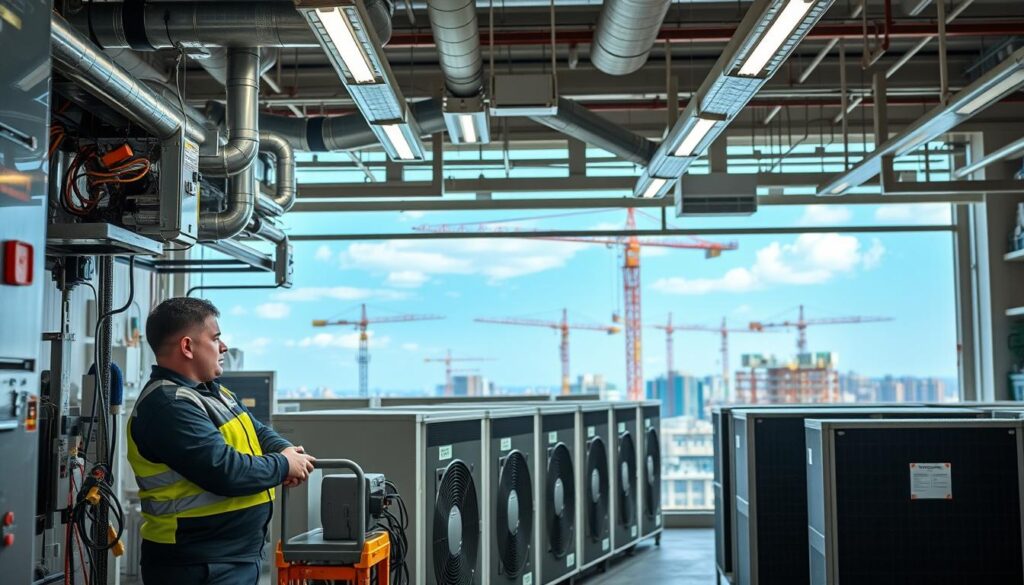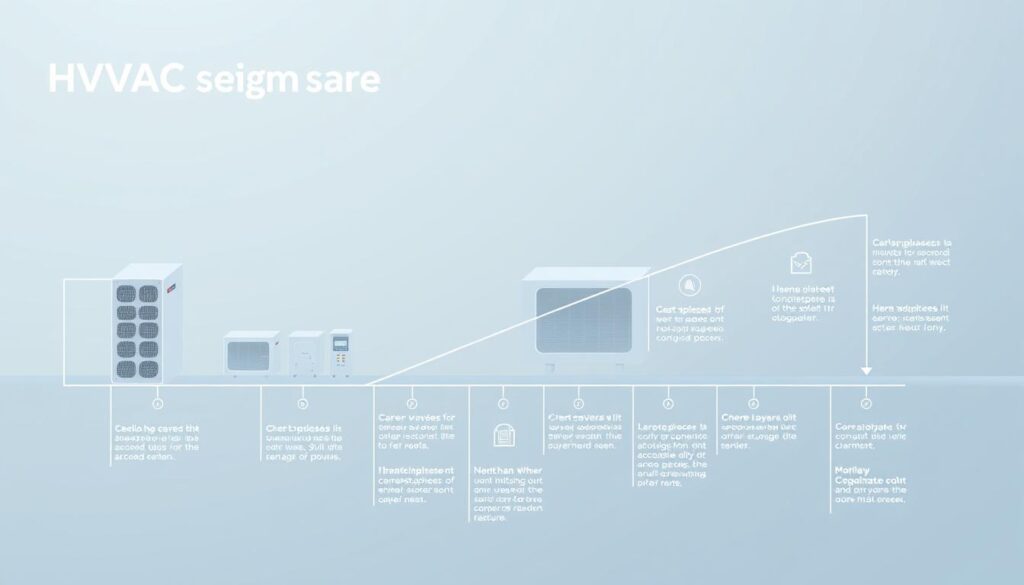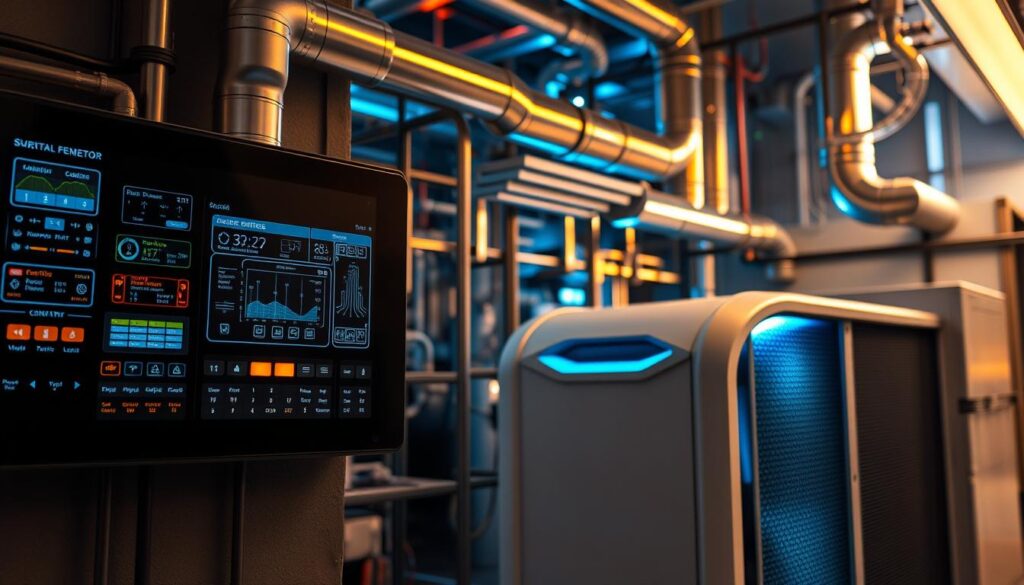Affiliate Disclosure
HVAC Guide Guys is a participant in the Amazon Services LLC Associates Program, an affiliate advertising program designed to provide a means for sites to earn advertising fees by advertising and linking to Amazon.
How Easy Is HVAC? Are you thinking about an HVAC career? It could lead to a stable and well-paying job. The heating, ventilation, and air conditioning field is exciting and rewarding.

The U.S. Bureau of Labor Statistics says HVAC jobs are growing fast. They expect a 13% increase from 2018 to 2028. This is much faster than the average job growth of 5%.
Many ask if HVAC is an easy career. It’s not simple. You need hard work, technical skills, and a desire to learn. With over 650,000 people already working, there’s room for new talent.
HVAC technicians are key in keeping places comfortable and efficient. They work in many areas, like homes, hospitals, and offices. This means lots of different job opportunities.
Key Takeaways
- HVAC field projected to grow 13% by 2028
- Average starting salary around $49,500 per year
- Opportunities for specialization and advancement
- Careers can begin directly after high school
- Training typically takes 1-2 years
Table of Contents
Understanding the Basics of HVAC Systems and Work
HVAC systems are key to comfortable homes and workplaces. They manage heating, ventilation, and air conditioning. Knowing how to install and maintain them is vital for everyone.
Today’s HVAC systems are more than just heaters and coolers. They use about half of our home energy. Keeping them efficient is important for saving money and staying cozy.
Core Components of HVAC Systems
HVAC systems have important parts that work together:
- Heating units (furnaces, heat pumps)
- Cooling systems (air conditioners)
- Ventilation networks
- Thermostats and control mechanisms
Primary Job Responsibilities
HVAC technicians do many tasks. They install, fix, and maintain systems. Their main jobs are:
- System installation
- Diagnostic evaluations
- Repair and replacement of components
- Performance optimization
“Proper maintenance can extend your HVAC system’s lifespan by up to 5 years and improve energy efficiency by 25%.” – HVAC Industry Expert
Essential Technical Knowledge
HVAC pros need a wide range of skills. They must understand:
- Electrical systems understanding
- Refrigeration cycle comprehension
- Mechanical system diagnostics
- Energy efficiency principles
The HVAC market is growing fast, expected to hit $277.95 billion by 2026. There’s a big need for skilled workers. Starting this career means always learning and staying up-to-date.
Explore Our HVAC Shop
Looking for top-rated HVAC tools, parts, and accessories? Visit our shop and find the perfect solution for your needs.
Visit the ShopHow Easy Is HVAC: A Realistic Assessment
Thinking about an HVAC career? It’s not just about the technical side. You’ll need physical strength, to be flexible, and always keep learning.
Being an HVAC technician comes with important things to think about:
- Physically demanding work environment
- Varied and sometimes unpredictable schedules
- Potential safety risks in the workplace
- Continuous skill development requirements
HVAC technician skills go beyond just knowing about mechanical systems. You’ll need to solve problems, think critically, and be adaptable. The job has its own set of challenges that test your skills and how you handle stress.
“Success in HVAC isn’t just about what you know, but how quickly you can learn and adapt.” – Professional HVAC Trainer
In 2020, HVAC technicians faced a lot of workplace injuries:
| Injury Type | Number of Incidents |
|---|---|
| Sprains, strains, tears | 2,420 |
| Cuts and lacerations | 890 |
| Fractures | 870 |
Is HVAC an easy career? It’s tough but worth it. You’ll need to be dedicated, physically fit, and enjoy solving complex problems. The job can be tough, but it offers steady work and chances to grow.
Getting professional certifications, like those from North American Technician Excellence (NATE), can boost your skills and reputation in this competitive field.
Education and Training Requirements for HVAC Technicians
To start a career in HVAC, you need to plan your education and training well. There are different paths to help you learn the skills needed. These paths lead to important certifications in the field.
There are many ways to become an HVAC technician. Knowing these options helps you choose the best path for your career.
Trade School Programs
HVAC training programs are designed to get you ready for the job. They last from 6 to 24 months. You’ll learn a lot of technical skills.
- Average certificate program duration: 9-10 months
- Associate degree programs: Up to 2 years
- Estimated program costs: $1,200 – $15,000
Apprenticeship Opportunities
Apprenticeships are a big part of getting certified in HVAC. They mix classroom learning with real-world training. They usually last 2-5 years.
| Apprenticeship Characteristics | Details |
|---|---|
| Duration | 2-5 years |
| Training Components | Classroom learning + Hands-on experience |
| Employer Preference | High value placed on completed apprenticeships |
Certification Requirements
Getting certified shows you’re skilled and serious about your work. Important certifications include EPA refrigerant handling and technical endorsements.
Professional tip: Take high school courses in computer science, physics, and shop classes to build a strong foundation for your HVAC career.
With a 5% job growth rate from 2020 to 2030, and over 38,500 new jobs, good HVAC training is key. It can lead to great career opportunities.
Career Entry Points and Progression

Exploring hvac career opportunities is exciting, with many entry points and chances to grow. The HVAC industry has paths for everyone, from newbies to seasoned pros.
Your HVAC career starts with entry-level jobs that need little experience. These roles are key for learning and growing in your career.
Entry-Level Wage Breakdown
| Position | Hourly Wage |
|---|---|
| HVAC Installer | $18.44 |
| HVAC Technician | $23.43 |
| HVAC Helper | $18.31 |
| HVAC Assembler | $24.38 |
To boost your hvac job chances, follow these career steps:
- Finish a trade school or apprenticeship
- Get EPA Section 608 Technician certification
- Get real-world experience in HVAC
- Get more specialized certifications
“Success in HVAC is about continuous learning and adaptability” – HVAC Industry Expert
Mid-level jobs need 3-6 years of experience and several certifications. Some cool mid-level jobs include:
- HVAC Service Manager (Average: $91,842/year)
- Commercial HVAC Service Technician (Average: $69,908/year)
- HVAC Controls Technician (Average: $54,632/year)
As you move up, you’ll find senior roles with earnings up to $125,000 a year. This includes general managers and systems design engineers.
Explore Our HVAC Shop
Looking for top-rated HVAC tools, parts, and accessories? Visit our shop and find the perfect solution for your needs.
Visit the ShopPhysical Demands and Working Conditions
Starting a career as an HVAC technician means facing unique challenges. It’s not just about knowing how to fix things. You need to be physically strong, flexible, and always put safety first.
Environmental Challenges
HVAC techs work in all kinds of weather. They might be in hot attics in summer or cold basements in winter. They have to stay in top shape and handle tough jobs.
- Navigate tight spaces and confined areas
- Work in various weather conditions
- Adapt to residential and commercial settings
Safety Considerations
Safety is key in HVAC work. Technicians need to know how to stay safe. This includes working with electricity, handling refrigerants, and wearing the right gear.
| Safety Requirement | Protective Measure |
|---|---|
| High Voltage Work | Insulated gloves and safety glasses |
| Refrigerant Handling | EPA Section 608 Certification |
| Height Work | Fall protection harnesses |
Work-Life Balance
HVAC jobs can be tough, with long hours during busy times. Summer and winter are the busiest seasons. Learning to balance work and personal life is essential for success.
“In HVAC, flexibility isn’t just about ductwork – it’s about managing your time and energy.” – Professional HVAC Mentor
Knowing what HVAC work entails helps you prepare for a rewarding career. It’s a challenge, but it’s worth it.
Salary and Job Market Outlook
Thinking about HVAC jobs? The field is full of great financial chances and career paths. The HVAC technician job market is growing fast, with good pay and lots of opportunities.
Here are the main money facts for HVAC workers:
- Median annual wage: $51,390
- Projected job growth rate: 6% over the next decade
- Annual job openings: Approximately 37,700
Your salary in HVAC jobs can change a lot based on your experience and what you specialize in. Newbies usually start at about $36,000. But, those with more experience can make up to $82,630 a year.
“The HVAC industry offers not just a job, but a dynamic career path with continuous learning and growth opportunities.”
Where you live also affects your job chances. Places like Texas, New York, and California are growing fast:
- Texas: 21% job market growth
- New York: 20% job market growth
- California: 14% job market growth
Getting certified can really boost your salary. Special skills like EPA Technician Certification and North American Technician Excellence (NATE) Certification can lead to better jobs and show you’re an expert.
Specialization Opportunities in HVAC
The HVAC industry is full of career paths beyond basic heating and cooling. With new technology, the field keeps growing. This opens up exciting ways for skilled people to grow their careers.
Looking into specializations can change your HVAC career. You can focus on areas that fit your interests and skills. These paths not only help you grow but also tackle big challenges in the HVAC world.
Residential HVAC Services
Residential HVAC services are a key career path for technicians. This area includes:
- Installing home heating and cooling systems
- Performing maintenance on residential equipment
- Diagnosing and repairing home climate control systems
Commercial HVAC Systems
Commercial HVAC careers bring bigger challenges and often better pay. Technicians here work with:
- Large-scale air conditioning systems
- Sophisticated ventilation networks
- Climate control for office buildings, hospitals, and schools
Industrial Applications
Industrial HVAC specialization needs advanced skills and knowledge of complex systems. Key areas include:
- Manufacturing facility climate management
- Process cooling and heating systems
- Precision temperature and humidity control
“The future of HVAC is not just about temperature control, but about creating sustainable, efficient environments.” – HVAC Industry Expert
By becoming an expert in these areas, you can build a fulfilling career. The HVAC industry is always changing, with lots of room for growth.
Explore Our HVAC Shop
Looking for top-rated HVAC tools, parts, and accessories? Visit our shop and find the perfect solution for your needs.
Visit the ShopTechnology and Innovation in Modern HVAC

The HVAC industry is going through a big change with new technology. This change is making HVAC technician skills better and solving big challenges. New innovations are changing how we handle heating, cooling, and air systems.
Some big changes are happening in HVAC:
- Smart HVAC systems powered by AI and IoT technologies
- Advanced energy-efficient solutions
- Predictive maintenance technologies
- Enhanced diagnostic tools
Virtual reality training and AI-empowered systems are opening up new chances for skilled technicians. Geothermal heat pumps, for example, are very efficient, working 200% to 400% better than old systems.
“Technology is revolutionizing HVAC, making systems smarter, more efficient, and environmentally friendly.” – Industry Expert
New tech like Variable Refrigerant Flow (VRF) systems can adjust refrigerant flow. This lets them control temperature better. These new tools mean HVAC pros need to keep learning and adapting.
The global HVAC system market is expected to grow a lot. It’s going from USD 202 billion in 2020 to USD 277 billion by 2025. This shows how much room there is for new tech in HVAC.
Building Your Own HVAC Business
Turning your HVAC career into a business needs careful planning and hard work. Starting your own HVAC company is a real goal for skilled technicians who know the industry well.
To start your business, you must master several key areas:
- Minimum 10 years of technical experience
- Strong understanding of business management
- Comprehensive knowledge of HVAC industry challenges
- Financial planning and budgeting skills
Successful HVAC entrepreneurs suggest creating a detailed business plan with at least 8 sections. Your plan should include market analysis, financial projections, and growth goals.
“The most successful HVAC businesses start with meticulous planning and a clear vision of their target market.”
Important steps for your HVAC business startup include:
- Obtain necessary certifications (EPA Type I, II, III)
- Register your business legally
- Secure proper insurance and bonding
- Develop a marketing strategy
- Create financial tracking systems
Financial experts advise getting professional advice on taxes. Choosing between a sole proprietorship and an S Corporation can affect your taxes a lot.
The benefits of owning an HVAC business are big. You’ll get to:
- Be your own boss
- Potential for higher income
- Choose projects you like
- Build your own brand
Success in the HVAC industry means always learning and keeping up with new tech and market needs.
Explore Our HVAC Shop
Looking for top-rated HVAC tools, parts, and accessories? Visit our shop and find the perfect solution for your needs.
Visit the ShopIndustry Challenges and Solutions
The HVAC industry faces many complex challenges. These challenges test the skills and adaptability of professionals. It’s key to understand these challenges to succeed in this field.
Common Technical Obstacles
HVAC repair is very complex. Technicians need to keep up with fast-changing technology. They must learn new skills and understand advanced system designs and smart technologies.
- Keeping pace with evolving technological innovations
- Managing increasingly complex system integrations
- Addressing sophisticated diagnostic requirements
Customer Service Aspects
Customer expectations in HVAC are getting higher. People want fast, efficient, and clear services. They also expect the latest solutions.
“In an era of instant communication, HVAC professionals must deliver exceptional service with precision and speed.”
- Maintaining clear communication
- Providing transparent pricing
- Demonstrating technical expertise
Business Management Hurdles
HVAC businesses face big challenges. With over 145,142 HVAC companies in the U.S., the competition is fierce.
- Managing seasonal demand fluctuations
- Controlling operational costs
- Recruiting skilled technicians
The industry is expected to grow by 6.1% from 2021 to 2026. This shows there are good opportunities for those who can handle these challenges.
Conclusion
Exploring the HVAC field shows a bright future for skilled workers. The HVAC industry is booming, with jobs growing by 15% by 2026. You can start a fulfilling career without needing a four-year college degree.
HVAC jobs go beyond just installing and fixing systems. You can work on homes, businesses, or factories. Salaries range from $45,910 to over $73,000 a year. Training takes just 6 to 24 months, preparing you for a role that needs both technical and problem-solving skills.
To succeed, keep learning and stay flexible. As energy efficiency grows, so does the need for experts in new technologies. Places like California, Texas, and Florida have lots of job opportunities for skilled technicians.
If you want a steady job or to start your own business, HVAC is a great choice. With the right training and a love for solving problems, you can have a rewarding and well-paying career in this vital field.

